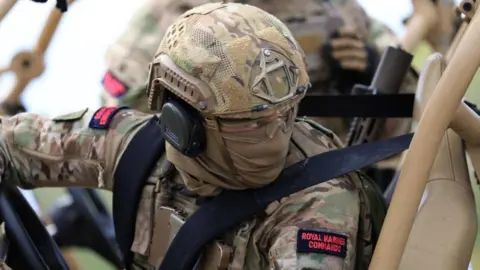UK military capability at risk, MPs warn
 MOD
MODThe UK will be left increasingly reliant on military allies because of a £29bn financial black hole in defence spending, MPs have warned.
The influential Public Accounts Committee (PAC) warned the government currently lacked a "credible plan" to fund the Ministry of Defence.
The PAC said this "undermined" the credibility of Britain's armed forces.
Chancellor Jeremy Hunt has promised defence spending will rise to 2.5% of GDP when "economic conditions allow".
Treasury minister Gareth Davies said he did not recognise the report's findings, and Downing Street said the prime minister had "overseen the largest sustained defence spending increase since the end of the Cold War and a £24bn uplift in cash terms over the spending review period".
"We are ensuring that we have the largest defence budget in history, increasing spend and ensuring that we have the funding that we need to protect UK national interests," a No 10 spokesperson added.
Labour's shadow defence secretary John Healey said the report was "more proof" that ministers had "lost control of the defence budget, failed to fix the 'broken' defence procurement system and wasted billions of pounds of public money".
The latest Nato data estimates that the UK spends 2.07% of GDP on defence.
But Paul Johnson, Director of the Institute for Fiscal Studies think tank, said Mr Hunt's promise to increase defence spending to 2.5% of GDP (national output) was "not worth the paper it's written on unless accompanied by some sense of how it will be afforded".
In a report on Wednesday's budget, Mr Johnson said the "economic conditions" allowed the government to use an estimated £10bn of headroom to allow cuts to National Insurance instead - which could have been spent on defence funding.
"That would have just about met the target - actions speak louder than words," he said.
Last year the National Audit Office (NAO) said the Ministry of Defence was facing a £16.9bn black hole in its finances - despite an injection of £46.3bn over the next 10 years.
This is the largest ever deficit between the armed forces budget and the cost of the UK's desired military capabilities.
But the PAC warned the actual deficit might be closer to £29bn, as parts of the armed forces limited their budget to what's affordable, excluding some government requests.
Dame Meg Hillier, chairwoman of the cross-party PAC, said: "In an increasingly volatile world, the Ministry of Defence's lack of a credible plan to deliver fully funded military capability as desired by government leaves us in an alarming place.
"Despite a budget increase, this year's plan shows a clear deterioration in affordability. The MoD must get to a better grip, or it won't be able to deliver the military capabilities our country needs."
Procurement delays
In a report on the MoD's Equipment Plan published on Friday, the PAC said gaps in military capabilities increased the UK's dependence on allies and eroded the armed forces' credibility.
The PAC also called on the government to prepare strategies for a world where allies reduced or ended their support for the UK.
The MPs pointed to "widely reported" recruitment issues, with more people leaving the armed forces than being recruited, and the mothballing of Royal Navy vessels due to crew shortages.
The MPs said: "With the support of its allies, the UK's armed forces continue to fulfil a crucial international role.
"However, many of its allies are facing similar challenges to the UK, which might affect their ability and willingness to continue providing extensive support."
MPs also renewed their criticism of the MoD's procurement processes, saying that slow delivery of new systems had caused gaps in military capability.
Only two of the MoD's 46 equipment programmes are currently judged to be "highly likely" to be delivered to time, budget and quality.
Five projects including nuclear submarine reactors, new communications technology and missiles have been judged unachievable.
Responding to the report, a spokesperson for the Ministry of Defence said the government was "significantly increasing spending on defence equipment to £288.6bn over the next decade" and "introducing a new procurement model to improve acquisition".
"Our Armed Forces stand ready to protect the UK and as a leading contributor to Nato, we continue to defend our national interests and those of our allies."
